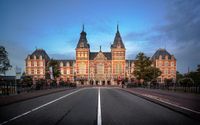Difference between revisions of "Parliament of Fluvique"
| Line 51: | Line 51: | ||
}} | }} | ||
| + | The Parliament of Fluvique (French: Parlement du Fluvique, Spanish:Parlamento de Fluvique) is the federal legislative branch of Fluvique, seated at the Parliament Palace in the national capital, Mevosa. The body consists of the Fluviquean monarch; an upper house: the Senate; and a lower house: the House of Representatives. Each element has its own officers and organization. The monarch summons and appoints each of the 335 members of the parliament, directly elected by elegible Fluviquean voters, with each MP representing a single electoral district. | ||
| + | By constitutional convention, the House of Representatives is the dominant branch of parliament, the Senate and Crown rarely opposing its will. The Senate reviews legislation from a less partisan standpoint and the monarch provides the necessary Royal Assent to make bills into law. The Monarch also summons parliament and can prorogue or dissolve parliament, the latter in order to call a general election. It will read the Throne Speech. The most recent parliament, summoned by King George in 2014, is the 26th since Kingdom in 1871. | ||
=Composition= | =Composition= | ||
| + | The Parliament of Fluvique is composed of three parts: the monarch, the Senate, and the House of Representatives. Each has a distinct role, but work in conjunction within the legislative process. Only those who sit in the House of Representatives are called members of parliament (MPs); the term is never applied to senators, even though the Senate is a part of parliament. Though legislatively less powerful, senators take higher positions in the national order of precedence. No individual may serve in more than one chamber of parliament at the same time. | ||
==Monarch== | ==Monarch== | ||
| + | |||
==Senate== | ==Senate== | ||
Revision as of 21:55, 10 November 2016
| Parliament of Fluvique | |
|---|---|
| Type | |
| Type | Bicameral |
| Houses |
Senate House of Representatives |
| Leadership | |
| Monarch |
Eugenie Since October 18, 2014 |
| Prime Minister of Fluvique |
August Moine, Social Justice Party Since February 11, 2008 |
| President of the Senate | Graham Patrick Duffell |
| Structure | |
| Seats |
335 97 senators 238 representatives |
| Senate political groups |
Government ()
Opposition ()
|
| House of Representatives political groups |
Government (92)
Confidence and supply
Opposition parties (118)
|
| Elections | |
| Senate voting system | Plurality by constituency |
| House of Representatives voting system | Plurality by constituency |
| Senate last election | November 12, 2016 |
| House of Representatives last election | October 20, 2013 |
| Meeting place | |
[[file: |frameless|alt= |frameless|alt= ]] ]] | |
| Parliament Palace | |
The Parliament of Fluvique (French: Parlement du Fluvique, Spanish:Parlamento de Fluvique) is the federal legislative branch of Fluvique, seated at the Parliament Palace in the national capital, Mevosa. The body consists of the Fluviquean monarch; an upper house: the Senate; and a lower house: the House of Representatives. Each element has its own officers and organization. The monarch summons and appoints each of the 335 members of the parliament, directly elected by elegible Fluviquean voters, with each MP representing a single electoral district.
By constitutional convention, the House of Representatives is the dominant branch of parliament, the Senate and Crown rarely opposing its will. The Senate reviews legislation from a less partisan standpoint and the monarch provides the necessary Royal Assent to make bills into law. The Monarch also summons parliament and can prorogue or dissolve parliament, the latter in order to call a general election. It will read the Throne Speech. The most recent parliament, summoned by King George in 2014, is the 26th since Kingdom in 1871.
Composition
The Parliament of Fluvique is composed of three parts: the monarch, the Senate, and the House of Representatives. Each has a distinct role, but work in conjunction within the legislative process. Only those who sit in the House of Representatives are called members of parliament (MPs); the term is never applied to senators, even though the Senate is a part of parliament. Though legislatively less powerful, senators take higher positions in the national order of precedence. No individual may serve in more than one chamber of parliament at the same time.
Monarch
Senate
| Province or Territory | Senators |
|---|---|
| Mevosa | 20 |
| Betham | 20 |
| Geneva | 20 |
| Saint Matthew | 10 |
| Aztus | 5 |
| Alkanter | 5 |
| Liberty Territory | 5 |
| Greencastle | 5 |
| Saint Lucie | 1 |
| Point Territory | 1 |
| Sallcia | 1 |
| Crenel | 1 |
| South Cape | 1 |
| Terralands | 1 |
| Yellow Islands Territory | 1 |
| Total | 97 |
House of Representatives
| Province or Territory | Representatives |
|---|---|
| Mevosa | 84 |
| Betham | 57 |
| Geneva | 47 |
| Saint Matthew | 20 |
| Aztus | 9 |
| Alkanter | 6 |
| Liberty Territory | 5 |
| Greencastle | 3 |
| Saint Lucie | 1 |
| Point Territory | 1 |
| Sallcia | 1 |
| Crenel | 1 |
| South Cape | 1 |
| Terralands | 1 |
| Yellow Islands Territory | 1 |
| Total | 238 |
